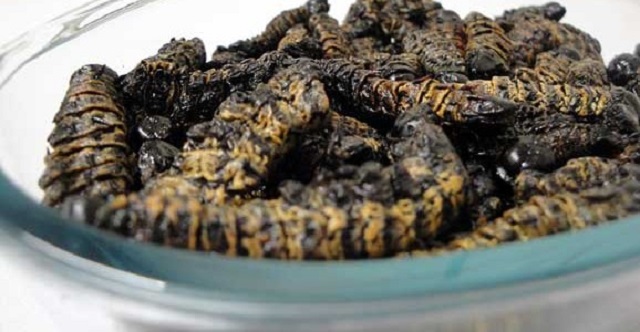Amacimbi are not just another can of worms

Lenox Lizwi Mhlongo
Hurray, they are here! My favourite dish has crawled back onto my plate and is back in season! I had a fried plate last night and look forward to the cooked crawlies tomorrow. Do not judge me by the food that I eat.
What about those who choose to feast on crabs, snails, horses, snakes, cockroaches, frogs, grubs, lizards, mice, bats, cats, dogs, grasshoppers, octopus, tortoises, seals, lobsters, prawns, eel, or god-forbid, monkeys? Mina, I just go for mopane worms or amacimbi in our local language.
The caterpillars of the anomalous emperor moth Imbrasiabelina, mopane worms are a culinary sensation here in Zimbabwe and the rest of Central and Southern Africa.
They are named after the Mopane (Iphane), a tree that is common in semi-arid areas whose big clover-like leaves are what the worms feast on during metamorphosis.
For the poverty-stricken people of the region, particularly Matabeleland South, the mopane worm, is manna from heaven.
The preparation after capture is meticulous. The guts are removed through squeezing and the worms are then boiled and left to dry out in the sun. Some use charcoal fires to speed up the drying process. Once dried, they can be cooked and the result is, depending on how they are prepared, a juicy, salty treat.
The mopane worm has all, but replaced traditional agricultural produce as a source of nutrition and income. From the onset of the rain season, when the mopane forms its tell-tale leaves, the worms emerge from their cocoons and crawl down the tree. So, do worm gatherers from all corners for the harvest.
The worm harvesting is a spectacle to behold. Scores of people are fanned across the sparse bushes, carrying containers of every conceivable shape and size, filling them to the brim with nature’s bounty. The worms are a delicacy mainly among the black population.
Connoisseurs say that there are more than 20 ways to prepare the mopane worm dishes. Take them fried as a snack, cooked with tomatoes and onions, boiled or simply dried. Everyone has his preference in the way they are prepared as a meal.
One enterprising entrepreneur once contemplated canning them. Whatever happened to that bright idea? Whichever way, they are prepared health experts wax lyrical about the dietary advantages of mopane worms. They are said to contain more protein and roughage than ordinary oats. Posters at rural health centres recommend the worms as supplement for pregnant women and those living with HIV.
There are those who would only eat mopane worms at gunpoint. The reason is purely psychological. Admittedly, it takes one some time to acquire the taste. One just must get over the initial phobia that associates the worms with other creepy-crawlies, experts say.
In some cases, this has been blamed on adults who discourage their children from eating the worms at an early age. This is despite the fact that the adults themselves grew up on a diet of worms.
The edible worms are just irresistible in a continent where hunger and famine stalk the land. Their popularity knows no borders. They can be found gracing the dinner tables of many households in South Africa, Zambia, Namibia, Botswana and Mozambique. In the Democratic Republic of the Congo (DRC), demand is outstripping supply with a kilogramme fetching a lot of money.
However, there are parts of the continent where the worms are, let’s say, despised. During a trip to Uganda in 1994, I attracted strange looks from my hosts when I tried to convince them that there was absolutely nothing wrong with having mopane worms for dinner.
A glossy magazine article that I presented as evidence, including colour photographs, only made things worse.
In freezing Sweden, our Scandinavian hosts could hardly disguise their shock when their Zimbabwean guests attempted to allay their fears describing in very graphic detail how good the grubs tasted like.
They must have wondered what other awful things we eat. I would jokingly slight their food. Honesty speaking, some of it tasted like cardboard. Not amacimbi sprinkled with ibilebile (chillies)!
Back in Zimbabwe, hundreds of people flock to the southern region from all corners to get a piece of the action. Predictably, politicians and community leaders have also waded into the fray.
Here, anything that smells of money attracts politicians like flies to a carcass. Government officials complain about the exploitation of poor rural villagers by unscrupulous traders who ask for low wholesale prices for the delicacy. The environmental damage by some garrulous harvesters’ cause points to a need to manage this potential lucrative economic activity.
These traders are sometimes accused of showing little respect for local customs and in turn, the environment. They needlessly chop down trees and desecrate sacred traditional shrines.
Local authorities in areas where mopane worms are harvested have been vigorously campaigning for a ban on “outsiders” cashing in on what is regarded by them as an exclusive resource. They still fail to cash in on the harvest in a way that will benefit local communities.
At least one local authority is issuing licences to approved traders while others insist on the locals doing the picking themselves and later selling the worms at set prices.
The issue has turned political and emotions run high at harvest time when scuffles break out between villagers and traders from elsewhere. In Botswana, landowners charge the gatherers a fee for both camping on their property and harvesting.
Unfortunately, at the height of the worm-picking season, poor and desperate villagers accept anything they are offered in return, from bags of corn meal, cups and plates to items of clothing in exchange for buckets of the worms. This has made them easy picking for unscrupulous buyers who are out to make a quick and easy buck.
Mopane worms are the salvation to an economically depressed and poverty-stricken region. For a continent always reaching out its hand for assistance, the worms offer an opportunity for its people to improve their lives. And they are not going to let any outsider take away their God given right.












Comments